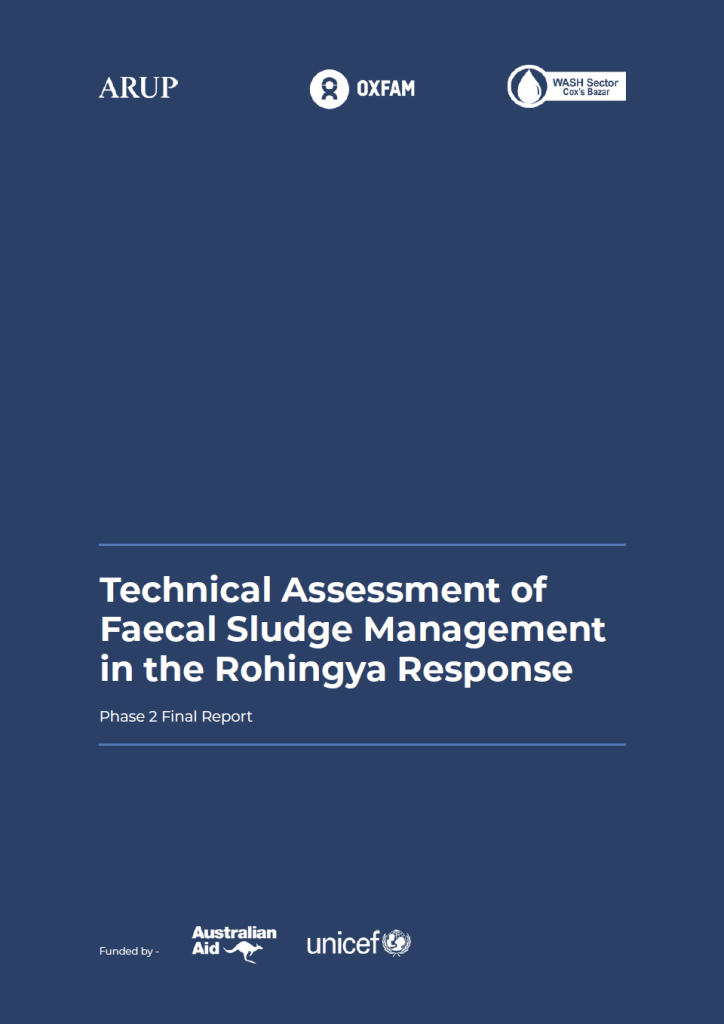Technical Assessment of Faecal Sludge Management in the Rohingya Response - Phase 2 Final Report
Author: Arup, Oxfam, WASH Sector Cox's Bazar
Year: 2022
On behalf of Oxfam GB and the CxB WASH sector, Arup have conducted this Technical Assessment study of different Faecal Sludge Management (FSM) methods in the Rohingya camps in Cox’s Bazar (CxB), Bangladesh. This is a phase 2 study, following completion of phase 1 in 2019.
This phase of the study builds on existing FSM technical information and monitoring and evaluation (collected by others since 2019), broadens to include whole FSM chain, wider range of stakeholders and camp areas covered and focuses on current challenges of sustainability and environmental impact, space requirements and costs. The WASH sector will use findings of this study to inform development of a (longer term) FSM Strategy for the camps. To this end, this study aims to provide a technical assessment to answer the following questions, where costs and operational robustness are the key criteria:
1. Does the FSM chain meet the need? i.e., does each stage in the FSM chain have capacity to manage the sludge generated, what are the bottlenecks and inefficiencies, and how can these be addressed?
2. Which type of FSTP is performing best against most assessment parameters? This should include reasoning for improving or decommissioning FSTPs.
3. Which mode of FS transfer/transport is most cost effective and resilient?
4. Does the containment type influence the sludge chain, and which containment is best?
5. Is the centralised or decentralised approach of FSM more cost effective and sustainable?
A core team of FSM experts was formed from the CxB WASH sector group, to guide and support the project. Arup, Oxfam, and the core team identified a wider stakeholder group (eight NGOs operating FSM in the camps) to include in the study and to provide the evidence/data for analysis and FSTPs to visit. Review meetings where also held with DPHE and other technical experts when appropriate.
A series of ‘camp wide’ and ‘detailed field’ assessments were completed to draw conclusions on the whole FSM chain and inform the discussion on centralised and decentralised FSM systems. Camp wide assessments are based on existing data provided by the sector and stakeholder data collected on operational cost and performance of containment, desludge and transfer. The FSTP assessments are based on the field visits covering 20 FSTPs and eight technology types, conducted during this study by technical partner Oxfam Bangladesh. The FSTPs types1 were compared against a set of indicators to summarise performance, including: cost; footprint area; speed of construction and commissioning/decommissioning; operation and maintenance issues; pathogen inactivation and environmental impact.
In many cases the existing or collected datasets are limited e.g. do not cover the whole camp area or all parameters required, some assumptions and extrapolation of data has been undertaken. The findings from the report should therefore be treated as provisional and relevant to the particular context in CxB.
FINDINGS
The camp wide review of desludge and transport data gave an approximate ‘total volume of sludge generation (at point of desludging)’ and the wet season variation, this was extrapolated to give an estimation of 1.1 l/h/d and a total monthly production of 29,718m3 of FS. Wet season impact resulted in approximately 26% more volume generated (at point of desludging). The analysis of the containment systems showed a wide range of latrines are used and the current dataset records many more types than the sectors ‘Unified Standard Design for Latrines’. Latrines are desludged more often either because of insufficient capacity for the number of users, mixed use (black and grey water), operational defects and/or poor infiltration. Analysis of the transport and transfer systems showed that IFSTN (permanent pipe networks) have a lower cost to operate and can transport increased volumes of sludge throughout the year. Their construction comes with an initial higher Capex but (based on available data) this investment can pay off within nine years when compared against other transport modes. The FS volume in transit during the wet season was noted as impacted by: poor access conditions to desludge and/or transfer, limited infiltration capacity (hence treatment capacity) at the receiving FSTP, and accessibility or overflowing of latrines in low land/flood prone areas.
Technical Assessment of Faecal Sludge Management in the Rohingya Response - Phase 2 Final Report
Would you like to see other resources here?
Give us your feedback"*" indicates required fields
Still have questions?
You could not find the information you were looking for? Please contact our helpdesk team of experts for direct and individual support.


